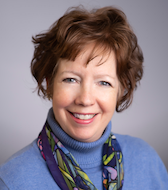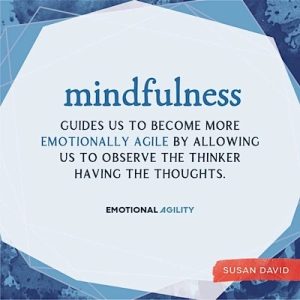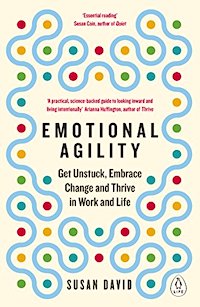 By Cathy Gassenheimer
By Cathy Gassenheimer
Executive Vice President
Alabama Best Practices Center
I like Susan David’s practical approach to mindfulness in our work and lives. In a recent newsletter she wrote:
I don’t see mindfulness as a “silver bullet” or something that needs to be done every minute of every day. (You don’t need to put out the trash mindfully, unless it works for you!) However, there are some ways to start cultivating more of a mindful presence in your life.
Susan David (PhD) is a psychologist on faculty at Harvard Medical School, co-founder and co-director of the Institute of Coaching at McLean Hospital, and CEO of Evidence Based Psychology. Originally from South Africa, she lives outside of Boston with her family.
She’s worked with senior leadership of hundreds of major organizations and written for the Harvard Business Review, Time, Fast Company, and the Wall Street Journal. And she has a lot to say to educators in these most challenging times.
You may know Susan from her “viral” 2017 talk at TED Women:
One memorable quote: “When we push aside normal emotions to embrace false positivity, we lose our capacity to develop skills to deal with the world as it is, not as we wish it to be.”
Another longer but also memorable TED event was this March 2020 conversation with Susan David, just as the Covid pandemic was beginning to spread across America: “How to Be Your Best Self in Times of Crisis.”
Becoming mindful at your own chosen speed
I’m sure Dr. David won’t mind me sharing some of her ideas about gradually blending more and more mindfulness into our daily existence. As she says, these are four good ways to start (I’m quoting her here):
Begin with the breath
For a full minute, do nothing but focus on your breath. Start by breathing in and out slowly, counting to four as you inhale, and counting to four as you exhale. Naturally, your mind will try to wander. Notice that, and then just let it be. Don’t berate yourself for “not being good at this.” Each time a thought pops into your head, just try to bring your focus back to your breath. That’s the whole game. It’s not about winning. It’s about engaging in the process.
 Mindfully observe
Mindfully observe
Pick an object in your immediate environment—a flower, an insect, your big toe—and focus on it for one minute. Really look at it and try to see it as if you’ve just arrived from Mars and are observing this thing for the very first time. Try to isolate and identify its various aspects and dimensions. Focus on the color, the texture, any movement it makes, and so on.
Rework a routine
Pick something you do every day and take for granted, like making coffee or brushing your teeth. The next time you do it, focus on each step and action, each element of sight and sound and texture and smell. Be fully aware.
Really listen
Select a piece of music such as quiet jazz or classical and really tune in—use headphones if you can—as if this was the first music you’d ever heard. Don’t judge it: Just try to identify different aspects of rhythm, melody, and structure.
Cathy again: These are simple acts that can bring us a measure of peace and clarity in what’s already been one of the most stressful years ever for many of us. If you’re a school or teacher leader, perhaps Susan David’s insights are something to share with your colleagues and friends.
More resources from Susan David
 ► Her bestselling book: Emotional Agility. Get Unstuck, Embrace Change, and Thrive in Work and Life.
► Her bestselling book: Emotional Agility. Get Unstuck, Embrace Change, and Thrive in Work and Life.
► Her TED Talk: The Gift and Power of Emotional Courage (9.5M views!)
► Her 3 TED Podcasts: Checking In with Susan David.
► Her Emotional Agility quiz: Personalized feedback on how to become more effective.
► Her twice-monthly newsletter: Insightful advice to help you thrive.

0 Comments on "4 Quick Ways You Can Begin to Increase Your Mindfulness"